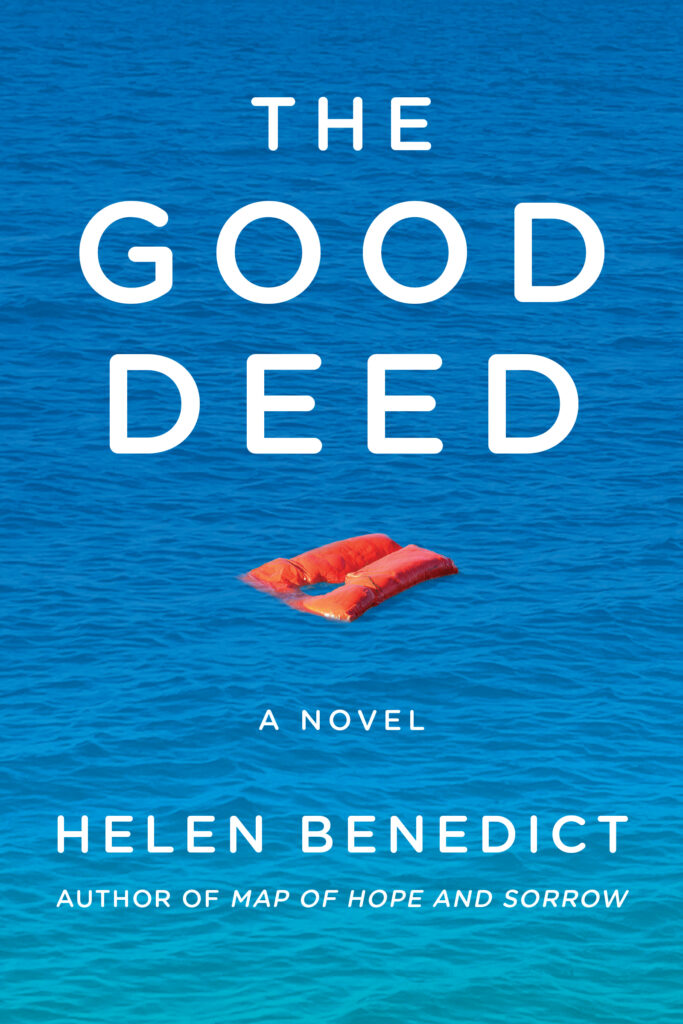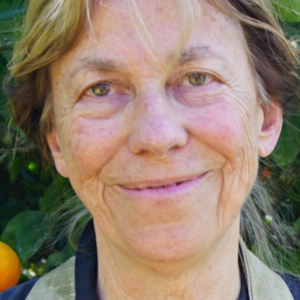
Darkness had already closed in by the time we reached the coast of Turkey, the moon a mere wisp in a sky clotted with clouds, and because it was too dangerous to light up a torch or a telephone, we could see little beyond the sand and stones beneath our feet. A rough-looking man appeared out of the night, almost invisible in black clothes, and hustled us into a cove crowded with people. I could just make out the shape of a gray, inflatable dinghy on the water about seven meters long; too small for even the fifteen passengers we’d been promised, let alone the dozens waiting on the shore. I glanced at Leila, my skin tightening.
Shadowy figures moved about distributing orange life jackets to those who paid. Leila managed to buy one for each of the children but the jackets ran out before she, Farah or I could buy our own. None of us knew how to swim.
“Look how fat I am, Mama!” Dunia said with a giggle as Farah buckled the jacket around her chest.
The man in black walked over to us while we were strapping the boys into their own jackets. “No bring so many people ’less you pay,” he said to Leila in pidgin Arabic. I couldn’t see him well but I could see that he was large and muscular.
Dunia edged closer to Farah and gripped her leg.
Leila straightened up, her hand on Majid’s shoulder. “But I already did pay. And this is not the boat I was promised.”
The man only replied, “Pay more or one stay here.” A finger of steel ran down my spine. Was this the moment Leila would abandon me? I was, after all, not her child. And where was Mama?
Leila pleaded as best she could, but this only enraged the man further, so she finally handed over the money. By now, I was sure, her wad of liras must have dwindled to almost nothing.
Tucking the cash away, the smuggler stepped aside to let us pass, but just as we did, he lunged forward, snatched up Dunia and turned to run.
Farah screamed and threw herself at him, catching him by the arm. “Give her back, son of a pig! Give my child back!” she yelled. Leila and I tackled him as well, all three of us screaming while Dunia shrieked and struggled in his grip.
Kicking us away, the man clamped his hand over Dunia’s mouth. “Shut up! You want bring police?”
“Let her go!” we screamed again, still wrestling him; only this time we screamed in a whisper.
“If I do, mother and child stay. Boat full.”
By now the other passengers had noticed the commotion and were gathering around us, also pleading with the smuggler to let Dunia go. But then two new men approached brandishing pistols. “Be quiet or police come!” they hissed, and seizing Leila and me by our arms, they dragged us away, each of us clutching the hand of one of the boys, who stumbled beside us, sobbing in fright. We tried to turn and see what was happening, but the smugglers only thrust their guns into our backs, forcing us and the other passengers into the frigid water and up to the boat, where they heaved us in like netted fish. “Farah!” Leila cried, scrambling to the side as the smugglers shoved the boat away from the shore. “Farah!”
“Allah have mercy!” the passengers wailed. “For pity’s sake, turn back and let them come!”
The smuggler piloting the boat only barked at us again, waving a gun, and although his Turkish was incomprehensible, his message was clear enough. We could do nothing but look on in helpless silence while the figures of Farah and Dunia and the others who had been left behind stretched out their arms to us, weeping and calling. As the boat motored away, we watched them grow smaller and smaller on the shore until all we could see was the orange dot of Dunia’s life jacket. And then even that was gone.
Leila said nothing, nor did she cry. She simply cleared us a spot on the floor amongst the seventy or so people crammed into the boat with us, and made us sit, wet and cold as it was. “Mama, are those men going to hurt Dunia?” Hazem asked, his eyes big and frightened, his hair dripping.
“Mama, will you be angry if I peed myself?” Majid whispered between his chattering teeth.
“What’s going to happen to them?” was my question.
Leila remained silent a long time, staring out at the black water surrounding us. But, at last, she gathered the boys under her arms, pulled our sodden bags closer and spoke, her voice thick with sorrow. “We must put our trust in Allah, children. Now, no more talking.”
The boat churned on, the passengers still calling to Allah, although quietly now, when a small speedboat appeared out of the night and pulled up to our side. We thought it was the police and a new terror seized us. But then our smuggler let go of the outboard motor, jumped into the boat, and sped away.
A fresh shout of horror arose from us. None of us had the skill to steer; none of us had even been in a boat before, most having lived our lives in cities or on farms. How were we to prevent ourselves from being washed helplessly out to sea and drowned? But after the first panic passed, the men forced a teenager of seventeen, timid and alone, to take hold of the outboard motor handle. He was called Ali from Aleppo, a woman beside me told us, and ISIS had beheaded his entire family before his eyes. “Steer west,” one of the men ordered him, consulting the compass on his phone. “If you refuse, we’ll throw you overboard.” So steer Ali did. Why the other men would not help him I only came to understand later.
I looked at the passengers crushed up against me, wondering if they felt as near to death as I did: a grandmother in a black embroidered zabon so heavy it would drag anyone to the bottom of the sea. Three stick-limbed children, wet and shivering. A pregnant woman as pale as frost, her young husband trying to shelter her from the cold. A crowd of boys my own age, jaws clenched, eyes narrowed. We might have each held a history and a hope, a name and a family, but here we were nothing but prayers in the wind.
We sailed through the dark for some six hours, the rubber boat swinging and heaving with each slap of a wave, the sea writhing around us like a herd of monstrous snakes. At first I couldn’t understand why the journey was taking so long, Kuşadasi beach being less than an hour away from the shores of Greece. But then I realized that the winter wind was driving us in haphazard directions, just as it was battering our bodies, and that neither Ali nor anyone else would be able to steer our rubber balloon of a boat against such force.
Human beings can learn to endure almost anything if we have to, is that not so? In prison I had learned to endure the loss of any sense of the sexual act as tender or loving, which I knew from poetry but had never experienced. I had even learned to endure much of the pain inflicted on me. But one thing I could never bear was the theft of my will, of my sovereignty over my mind, my control over my body. That is the thing above all else that tempted me to take my life.
On the boat, the division between what we could and could not endure was much the same. We could bear up under the cold and wet, the stink of vomit and diarrhea, the nausea and even the stinging salt and thirst that made our tongues swell and our throats as abrasive as sand, although the thirst was the cruelest. We could also withstand being pressed so tightly together that we could hardly move—the old woman in the zabon had been leaning against my leg for so many hours it had turned numb. But our inability to control whether we would be tipped out of the boat at any moment or captured by those who would drag us back to prison or death—that was a torment that gripped us in its teeth like a wolf and would not let go.
Yet even in the face of this, there were heroes among us. Women who sang soothing songs to their babies and so to anyone close by. Men who organized us so that we could not hoard water but had to share it. A young woman who entertained the children with stories. Peacemakers who prevented fights between the men, many of whom were crazed by anger and the horrors of war. An old woman who sent up constant prayers to Allah to protect us all. Leila, who shared our dates and biscuits with the other passengers and monitored our spirits despite the loss of her own—as she does to this day.
I was no hero, though. I’d forgotten how to tell stories. I could no longer sing or pray, and I had no food to share. The most I could do was cradle one child or another, yearn for Mama, and sway in my own urine and fear.
Only when the night began to pale and the sea to lighten from black to dark gray did we draw within our first sight of land. It was nothing but a craggy gray rock bristling with black trees but it was enough to make my fellow travelers break into shouts of relief and joy and cry out their thanks to Allah. Even Hazem and Majid joined in the excitement.
Leila and I, however, remained silent. She knew how very far from Farah and Dunia we had come by then, just as I finally understood that Mama would never join me and had never intended to—that I had lost her not only for the moment but forever.
__________________________________
From The Good Deed by Helen Benedict. Used with permission of the publisher, Red Hen Press. Copyright © 2024 by Helen Benedict.


